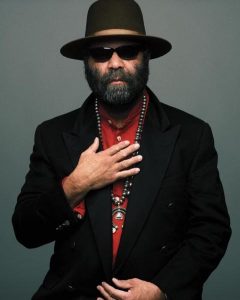Part of Taylor’s appeal is his contrasting character traits. But it is precisely this element of surprise that makes him one of the most compelling artists to emerge in recent years. In fact, Guitar Player magazine writes, “Otis Taylor is arguably the most relevant blues artist of our time.” Whether it’s his unique instrumentation (he fancies banjo and cello), or it’s the sudden sound of a female vocal, or a seemingly upbeat optimistic song takes a turn for the forlorn, what remains consistent is poignant storytelling based in truth and history.
Otis Taylor’s new album “Fantasizing About Being Black” opens with a bumpy rhythm section under a freewheeling solo cornet, stinging lap-steel guitar and a devastating representation of a black man who, in the Deep South in the 1930s, wouldn’t dare look a white man in the eye: “I’m alive now, be dead soon,” Taylor intones on “Twelve String Mile.” Taylor calls his style of music “trance blues” — moody, repetitive grooves that create space for spare, evocative lyrics and urgent ideas. On 2013’s My World Is Gone, Taylor tackled the treatment of Native Americans by the U.S. government; now, on Fantasizing About Being Black, he confronts the historical trauma of the African-American experience. The subject matter isn’t easy, but the hypnotic style won’t let you go. “A big black man, got dark, dark eyes / Big, big man, got dark, dark skin,” Taylor moans. “Nobody sees me.” But we hear him.
—Micah Schweizer, Wyoming Public Media’s Wyoming Sounds
# # #
Who Is Otis Taylor?
Otis Taylor is a critically acclaimed blues musician whose work speaks to the tragic, haunting legacy of America’s treatment of the disenfranchised, often, specifically, African-Americans. His songs provided emotional resonance in popular movies and hit television shows, and his albums have proved themselves to be a soundtrack to the darkest moments one can experience.
Yet, as he puts it in his official website’s biography, “I’m good at dark, but I’m not a particularly unhappy person. I’d just like to make enough money to buy a Porsche.” Furthermore, before his songs reached critical fame, he achieved a level of local celebrity in Denver, not for the genius of his music, but because, as a teenager, he rode to school on a unicycle while strumming his banjo.
Early Life
Born in Chicago, Illinois, in 1948, Otis Taylor was only a child when his uncle was shot to death. Seeking to raise their son in a safer environment, his parents moved the family to Denver. There, Taylor fell in love with blues music and the banjo. However, after learning of the racially charged history behind the popularity of the instrument, he developed his guitar and harmonica skills.
As a young man, Taylor toured Europe and North America as a professional musician, and played for a short time with Zephyr, with famed vocalist Candie Givens, and later with the Legendary 4Niktors. In 1977, Taylor stepped away from his passion to become an antique dealer. During this time, he also utilized his experience as a master unicyclist and coached a nationally ranked cycling team.
Music Career
It took until 1995 for Taylor to restart his musical career. He began by playing an intimate show in Boulder, and one year later he released his first album, “Blue-Eyed Monster.” His impactful second album, “When Negroes Walked the Earth,” brought critical acclaim and started a prolific period that saw him produce nine albums from 2001 to 2010, many with the Telarc
International.
During this period, he also stretched the definition of blues, originating a fusion genre Taylor dubbed “trance-blues.” This musical form calls for repetitive looping beats that create space for urgent lyrics falling on the darker end of the emotional register.
Taylor brought this genre to the music festival space when he created and performed in the first ever Trance Blues Festival. Staying true to his Colorado roots, the festival plays every year in Boulder.
Over the years Taylor’s deep baritone voice and consistent push for expansion of the blues genera have earned him a number of prestigious accolades including, Down Beat magazine critics’ Poll that named “Taylor’s Truth is Not Fiction” as Blues CD of the Year for 2002 and Living Blues readers’ poll awarded him “Best Blues Entertainer” title in 2004. In 2005, Down Beat named Taylor’s “Double V” as Blues CD of the Year, “Definition of a Circle” as Blues CD of the Year for 2007 and “Recapturing the Banjo” as “Blues CD of the Year, 2008.”
https://cmhof.org/who-is-otis-taylor/
https://www.otistaylor.com/


